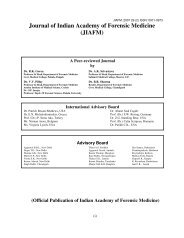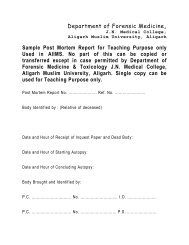Download - forensic medicine
Download - forensic medicine
Download - forensic medicine
Create successful ePaper yourself
Turn your PDF publications into a flip-book with our unique Google optimized e-Paper software.
JIAFM, 2007 - 29(4); ISSN: 0971-0973<br />
Expeditious disposal does not mean that evidence,<br />
whether prosecution or defence, should be cut short<br />
and judgment be pronounced without examining<br />
material witness. Procedural law is required to be<br />
adhered to. Magistrates have been directed to issue<br />
summons to witnesses concerned at new and<br />
correct address.[12] However if unsuccessful, then<br />
he shall resort to other coercive measures.<br />
Duty of judiciary in rape cases:<br />
It has been repeatedly held by the Supreme Court in<br />
various judgments [13,14] that the name of the rape<br />
victim should not be disclosed. Of course if it is<br />
absolutely unavoidable as for example when framing<br />
the charges against the accused, the identity of the<br />
victim may be disclosed but not otherwise. The<br />
Supreme Court has observed that the name of the<br />
victim has been mentioned in many judgments by<br />
the trial courts. This is not only contrary to the views<br />
expressed by the Supreme Court but also contrary<br />
to statutory law (228A IPC). The Supreme Court has<br />
directed the trial courts that when they are dealing<br />
with the cases of the sexual offences the name of<br />
the victim should not be disclosed.[15] The Punjab &<br />
Haryana High Court circulated a copy of judgment<br />
Angrej Singh v. State of Punjab (P&H) 2007 (1) RCC<br />
235 among the learned session judges working in<br />
the states of Punjab and Haryana for strict<br />
compliance of the observations of the Apex court<br />
while interpreting section 228 A (1) IPC and to make<br />
the trial court conscious of the amendment.<br />
Section 327 (2) and (3) of Criminal Procedure Code<br />
are in the nature of exception to the general rule of<br />
open trial, in spite of the amendment, however it has<br />
been seen that the trial courts either are not<br />
conscious of the amendments or do not realize its<br />
importance for hardly does one come across a case<br />
where the trail of rape case has been conducted by<br />
the trial court ‘in camera’. It casts a duty on the court<br />
to conduct the trial of rape cases etc. invariably ‘in<br />
camera’. The courts are obliged to act in furtherance<br />
of the intention expressed by the legislature and not<br />
to ignore its mandate and must invariably take<br />
recourse to the provisions of Section 327 (2) and (3)<br />
CrPC and hold the trial of rape cases ‘in camera’.<br />
Trial in camera would not only be in keeping with the<br />
self-respect of the victim of crime and in tune with<br />
the legislative intent but is also likely to improve the<br />
quality of the evidence of a victim because she<br />
would not be so hesitant or bashful to depose frankly<br />
as she may be in an open court under the gaze of<br />
public. The improved quality of evidence would<br />
assist the courts in arriving at the truth and sifting<br />
truth from falsehood.[16] The Privy Council in 1913<br />
has clearly held that the evidence of the victim may<br />
be recorded in an open court, after taking all the<br />
precautions, after sending the general public, press<br />
and other persons, including junior advocates of the<br />
defence counsel.[17]<br />
The court should not sit as a silent spectator while<br />
the rape victim is being cross examined by the<br />
defence. It must effectively control the recording of<br />
evidence in the court. The court should ensure that<br />
cross examination is not made a means of<br />
harassment or causing humiliation to the victim of<br />
rape. It has been observed that the rape victims are<br />
put some rather strange, embarrassing and<br />
unwanted questions. The trial judges must<br />
appreciate that the purpose of cross-examining a<br />
victim of rape is not to humiliate her but to get to the<br />
truth of the matter. Consequently questions which<br />
have no real relevance to the issues before the court<br />
and which are apparently directed to cause<br />
discomfiture, if not humiliation, to a victim of sexual<br />
offences, should not be permitted. Such questions<br />
do not serve the ends of justice and it is pointless<br />
allowing any such cross-examination to take<br />
place.[18]<br />
The Supreme Court expressed strong disapproval of<br />
the approach of the trial court and its casting a<br />
stigma on the character or rape victim. Such<br />
observations lack sobriety expected of a judge. Even<br />
in cases where there is some acceptable material on<br />
record to show that the rape victim was habituated<br />
to sexual intercourse, no such inference like the<br />
victim being a girl of ‘loose moral character’ is<br />
permissible to be drawn.[19] No stigma should be<br />
cast against such a witness by the courts, for after<br />
all it is the accused and not the rape victim who is on<br />
trial in the court. The Supreme Court observed that<br />
the trial court should not search for contradictions<br />
and variations in the statement of rape victim<br />
microscopically, so as to disbelieve her version.<br />
Wherever possible it may also be worth considering<br />
that the cases of sexual assault on female are tried<br />
by lady judges [20] wherever available so that the<br />
victim can make her statement with a greater ease<br />
and assist the courts to properly discharge their<br />
duties without allowing the truth to be sacrificed at<br />
the altar of rigid technicalities while appreciating<br />
evidences in such cases. [21]<br />
The Courts are expected to deal with cases of<br />
sexual crime against women with utmost sensitivity.<br />
A socially sensitized judge is better statutory armour<br />
in cases of crime against women than long clauses<br />
of penal provisions, containing complex exceptions<br />
and provisos.[22] The legislative wisdom reflected<br />
by the statutes has to be respected by the courts<br />
and the permitted departure there from made only<br />
for compelling and convincing reasons.<br />
110


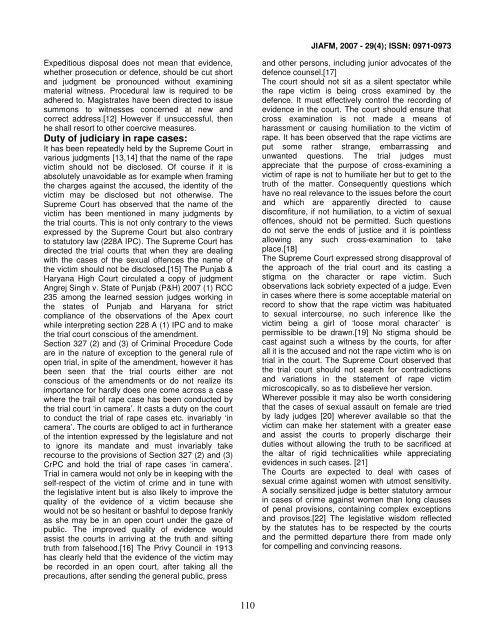
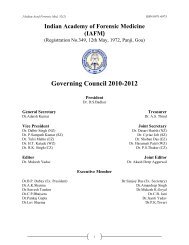
![syllabus in forensic medicine for m.b.b.s. students in india [pdf]](https://img.yumpu.com/48405011/1/190x245/syllabus-in-forensic-medicine-for-mbbs-students-in-india-pdf.jpg?quality=85)
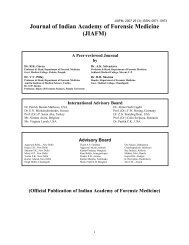
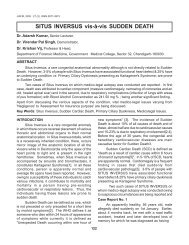
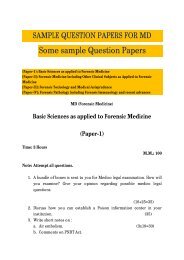
![SPOTTING IN FORENSIC MEDICINE [pdf]](https://img.yumpu.com/45856557/1/190x245/spotting-in-forensic-medicine-pdf.jpg?quality=85)
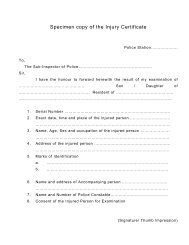
![JAFM-33-2, April-June, 2011 [PDF] - forensic medicine](https://img.yumpu.com/43461356/1/190x245/jafm-33-2-april-june-2011-pdf-forensic-medicine.jpg?quality=85)
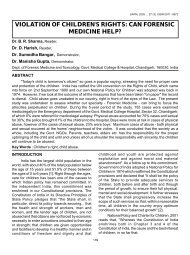
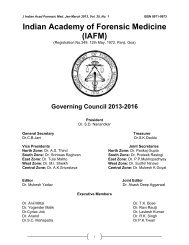
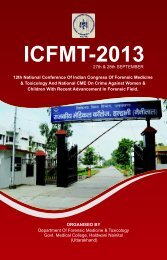
![JIAFM-33-4, October-December, 2011 [PDF] - forensic medicine](https://img.yumpu.com/31013278/1/190x245/jiafm-33-4-october-december-2011-pdf-forensic-medicine.jpg?quality=85)
